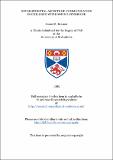Developmental aspects of communication in children with Down's syndrome
Abstract
This thesis presents a series of investigations into communicative interaction between mothers and their preschool children with Down's Syndrome (DS), and mothers and their infants with DS. Reference to the literature in this area indicates that there is a need to determine not only how the DS child and/or her/his mother differ from their nonhandicapped peers but also ways in which DS children's language can be accelerated. Insofar as the preschool child with DS is concerned, a series of four studies are presented. The first of these investigates the effect of the label "DS" upon the mothers' perceptions of children thus labelled. Using videotapes of nonhandicapped, above average infants, it is demonstrated that some of the mothers' ratings of children are negatively affected if the child is described as having "DS". This is found to occur to a significant degree in both mothers of DS children and mothers of nonhandicapped children, although the effect is not identical in both groups across all the ratings measured. To investigate whether any such negative distortions, or "labelling effects" would affect the interactive behaviour of mothers of ES children, a sample of mothers of DS children was videotaped, with each mother in turn playing separately with 2 sisters. These girls were four years old, nonhandicapped, non-identical twins. For the purposes of this experiment, one of the twins (the more developmentally advanced and the physically larger of the 2) was always described to the mothers as having DS, her sister always being described as nonhandicapped (i.e. the child least like a DS child - if either could possibly be thought of in that way - was described as having-DS). It was found that all but one mother believed the experimental manipulation of the label; videotape analyses revealed furthermore that mothers treated the sisters significantly differently. Specifically the supposed DS child was ignored more often than her sister with mothers not responding to her attempts to initiate interaction and thus giving her less opportunity to control or direct the interactions. Mothers also used different types of interrogatives with her, avoiding the use of those questions which required more complex answers (wh- type questions) and using overall far more questions requiring only a simple yes/no response. Moreover, audio-recorded interviews with the subjects in this experiment revealed them to be explaining and describing the supposed DS child's behaviour in a very negative way, interpreting her behaviour and speech on the basis of her diagnostic label, giving her little or no credit for any achievements. These results are discussed with reference to the literature on mother and DS child interaction, expectancy effects, and with reference to social psychological studies of stereotyping. (Abstract shortened by ProQuest.)
Type
Thesis, PhD Doctor of Philosophy
Collections
Items in the St Andrews Research Repository are protected by copyright, with all rights reserved, unless otherwise indicated.

